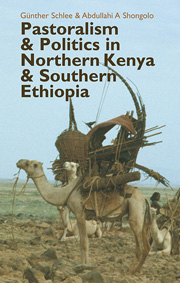Book contents
- Frontmatter
- Contents
- List of Maps and Figures
- List of Abbreviations
- Introduction
- 1 Moi Era Politics, Transnational Relations and the Territorialization of Ethnicity
- 2 The Post-Moi Period 2002–2007
- 3 Feedback and Cross-fertilization: The ‘Declaration of Indigenous Communities of Moyale District’
- 4 Some Comparative Perspectives, Conclusions and Recommendations
- References
- Index
- EASTERN AFRICAN STUDIES
2 - The Post-Moi Period 2002–2007
Published online by Cambridge University Press: 05 September 2013
- Frontmatter
- Contents
- List of Maps and Figures
- List of Abbreviations
- Introduction
- 1 Moi Era Politics, Transnational Relations and the Territorialization of Ethnicity
- 2 The Post-Moi Period 2002–2007
- 3 Feedback and Cross-fertilization: The ‘Declaration of Indigenous Communities of Moyale District’
- 4 Some Comparative Perspectives, Conclusions and Recommendations
- References
- Index
- EASTERN AFRICAN STUDIES
Summary
The later years of the Moi period brought an acceleration of the ethnicization of politics in Kenya. Politicians came to treat their constituencies as ethnic territories and to behave like ethnic leaders. Former pretences at modern statehood and universal citizenship were dropped to an increasing degree, at least in practice and in speeches given and discussions held in Swahili or local languages rather than in English. The change of government in December 2002 did not bring the change people hoped for. Ethnic clientelism remained the key tool of politics. It is therefore justified to deal with the late 1990s and the year 2000 with some detail, because it is this period in which ethnic exclusionism became treated more and more as normal and legitimate.
The proponents of ethnically pure sub-districts and districts and special grazing rights for the titular tribes spoke of time-honoured rights and traditional territories. As has been described in Identities on the Move (Schlee 1989a) and Islam and Ethnicity (Schlee with Shongolo 2012) however, there were no tribal territories in pre-colonial times. It was only the British who created ethnic districts and grazing areas as a miniaturized version of the European nation-state. It is these colonial boundaries which now are evoked for giving legitimacy to territorial claims. In pre-colonial times it was the elders of different groups within the Boran-centred Worr Libin Alliance who discussed matters of grazing and access to water points and the resulting pattern was not one of stable, neatly divided territories but of spatio-temporal arrangements with shared resources in one season and separation in another.
- Type
- Chapter
- Information
- Pastoralism and Politics in Northern Kenya and Southern Ethiopia , pp. 115 - 136Publisher: Boydell & BrewerPrint publication year: 2012

